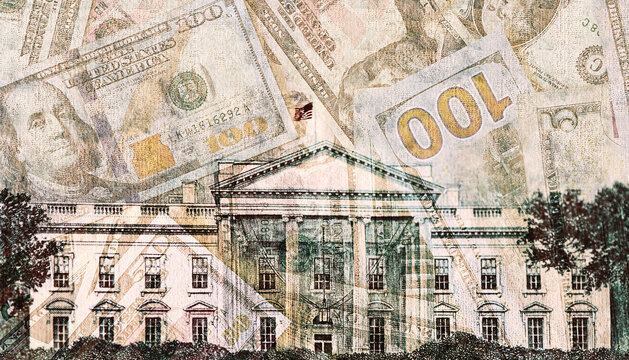
Past Presidents Have Tested Ethics Norms — This Time Is Different
A gifted jet from Qatar and crypto transactions raise novel questions about presidential self-enrichment.

Part of
You’re reading The Briefing, Michael Waldman’s weekly newsletter. Receive it in your inbox.
Eight years ago, the lobby of the Trump International Hotel in Washington became the symbol of influence peddling. Tourists giddily mingled with lobbyists and campaign donors. The cheapest cocktail went for $24. How quaint.
This term, Donald Trump Jr. announced that he is opening a private, members-only club in Georgetown called Executive Branch. Members of the Trump administration, CEOs, and tech executives are among those who have signed up. The membership fee is currently $500,000.
That is the context for the controversy now erupting over Qatar’s gift of a roughly $400 million airplane for use as the new Air Force One, a 747 that would be transferred to the Trump Presidential Library when he leaves office, potentially making it available for his personal use (although he denies he would use it). It’s outlandish on its own terms. And it is just the most visible part of a new ethos of self-dealing, with lines between public purpose and private enrichment not just blurred but erased.
Days before his return to office, Trump launched his own cryptocurrency token, $TRUMP, which immediately enriched him by an estimated billions of dollars (although the coin’s worth has since dropped). Since crypto is a purely speculative vehicle, this gave “investors” a chance to send funds straight to Trump, without disclosure or pretense. Sure enough, the United Arab Emirates, another country where he visits this week, gave him . . . sorry, “invested” $2 billion.
Trump’s family enterprise already owns a crypto mining company, World Liberty Financial, which benefits from his shift from skeptic to deregulator.
Then there are the transactions that all seem to end up with the first family being paid — starting with the $28 million paid by Amazon to First Lady Melania Trump for a documentary.
Now, let’s not romanticize a past golden age of government ethics. The White House saw the Crédit Mobilier scandal of the 1870s and Teapot Dome in the 1920s. Lyndon Johnson used the Federal Communications Commission to give preferential treatment to radio stations he owned. In more recent decades, presidents of both parties conducted a grueling schedule of nearly nonstop campaign fundraising. (My old boss Bill Clinton certainly got grief when party donors slept in the Lincoln Bedroom.) Hunter Biden was accused of peddling influence for personal gain before his father pardoned him on the way out of office.
What’s different here is that the funds are flowing not to a political party or campaign but to the officeholder as an individual. The transaction is direct, naked.
The founders were very concerned about an individual using the power of the presidency to enrich themselves and their family members. They focused sharply on the risks of corruption and were well aware of the myriad ways the system could be abused. And they were especially worried that foreign governments could influence American presidents.
At the Constitutional Convention, Gouverneur Morris feared the possibility of the president receiving foreign bribes: “One would think the King of England well secured against bribery. Yet Charles II was bribed by Louis XIV.” The founders wrote anti-corruption protections into our Constitution.
Article I of the Constitution forbids any officeholder from accepting any gift or title from any “King, Prince, or foreign State” without congressional consent. It’s called the Foreign Emoluments Clause. At the Virginia ratifying convention for the Constitution, Edmund Randolph made clear how viscerally the framers recoiled from the possibility of foreign funds. He described “an accident, which actually happened, [which] operated in producing the restriction. A box was presented to our ambassador by the king of our allies. It was thought proper, in order to exclude corruption and foreign influence, to prohibit any one in office from receiving or holding any emoluments from foreign states.”
Trump said, “I would be a stupid person” to turn down the $400 million plane. But remember that the Emoluments Clause is in the part of the Constitution making clear Congress’s power — it’s not up to the president to decide.
In his first term, Maryland and the District of Columbia sued, alleging that Trump illegally profited from foreign and domestic officials who visited his hotel. We agreed. That case got tied up in court, and in 2021, the Supreme Court ultimately dismissed it since Trump was no longer president.
So what lessons can we learn from this, and what ironclad rules could prevent future presidents from profiting so brazenly from office?
To start, Congress should make clear it does not approve of this massive foreign gift to our president. More comprehensively, Congress could pass legislation to fully enforce the Constitution’s Foreign Emoluments Clause and remove the procedural hurdles that derailed lawsuits in Trump’s first term.
Then it would be time to recognize that we have relied on common sense or self-restraint from previous chief executives. The Brennan Center’s task force of Republican and Democratic former senior officials recommended that presidents be required to put their businesses and assets into a blind trust, a proposal that is part of the Protecting Our Democracy Act that fell to a filibuster in 2022.
Even those protections may be inadequate. Neither the founders nor later generations of lawmakers profited from meme coins.
Out of today’s scandals come tomorrow’s reforms. For now, all of our astonished outrage is a good start.
More from the Corruption in America collection
-
What Is Political Corruption and What Can We Do About It?
It hurts ordinary Americans in concrete ways, and the risk has never been greater given today’s unprecedented mixing of private wealth with political power. -
Codifying the Constitution’s Emoluments Clauses
To prevent corruption, the Constitution prohibits the president and other officials from receiving untoward benefits. Congress, however, must take action to enable enforcement. -
Political Donors Should Not Be Above the Law
The line between public service and private gain continues to blur as financial elites secure pardons and regulatory leniency following campaign contributions.




